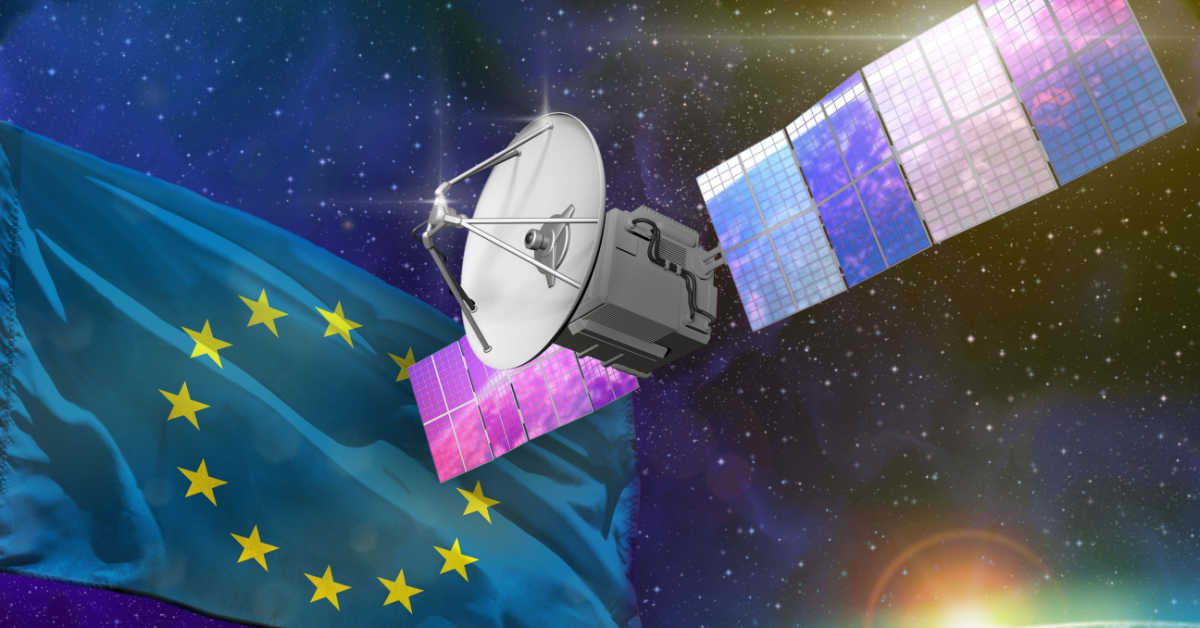European Companies Form Space Jam To Secure Comms Sovereignty With Satellites

A bunch of European space and telecoms companies have banded together to answer the EU's call for a satellite constellation to guarantee "communications sovereignty" for the region.
The IRIS² (Infrastructure for Resilience, Interconnectivity and Security by Satellite) program was announced last year, following an agreement between the European Parliament and EU member states to invest €2.4 billion ($2.6 billion) to make the project happen.
Now a number of companies with space and telecoms expertise across Europe say they have formed a partnership to respond to the European Commission's call for tender on the IRIS² program.
The group includes some big names in the industry, with Airbus Defence and Space, Eutelsat, Hispasat, SES and Thales Alenia Space making up the main players in what is being styled as an "open consortium."
In a joint statement, the companies said the consortium will also rely on the services of a "core team" of other technology companies, including Deutsche Telekom, OHB, Orange, Hisdesat, Telespazio, and Thales.
As detailed last year, the main aim of IRIS² is to put in place a space-based system for secure communication so that EU governments and agencies will not have to rely on infrastructure operated by third countries for these services.
The project also has the goal of enabling the private sector to operate commercial telecoms services and provide high-speed broadband connectivity, especially in areas that are not well served by terrestrial networks.
- Space: The final frontier, or the next venture capital gold rush
- China reportedly let AI control a satellite, which then observed rivals India and Japan
- In wars of the future, national security won't end at space
- OneWeb lofts last batch of satellites to enable global internet service
Anticipated costs of delivering this project are estimated to be at least €6 billion ($6.6 billion), with the EU contributing the agreed €2.4 billion, and the remainder expected to be covered by private sector investment.
Implementation of IRIS² is likely to follow an incremental approach, with the European Commission saying it hoped the first satellites would be in place to deliver initial services in 2024, with full operational capability by 2027.
When the funding was agreed last year, European Commissioner Thierry Breton greeted it as a historic event, saying: "IRIS² establishes space as a vector of our European autonomy, a vector of connectivity and a vector of resilience."
However, he also said that while building IRIS² would rely on the "know-how of the major European space industries," it was expected that 30 percent of the work would be carried out by startups, a goal that may be thwarted with the consortium made up of so many large companies.
Telecoms industry analyst Paolo Pescatore at PP Foresight told us that it "makes far more strategic and commercial sense to work together rather than have individual small groups."
This, he added, would be good news for consumers as well as businesses to ensure they are able to receive connectivity in hard-to-reach areas.
"Satellite remains the next and last frontier in connectivity," he said.
The European Commission declined to comment on the consortium and its bid. ®
From Chip War To Cloud War: The Next Frontier In Global Tech Competition
The global chip war, characterized by intense competition among nations and corporations for supremacy in semiconductor ... Read more
The High Stakes Of Tech Regulation: Security Risks And Market Dynamics
The influence of tech giants in the global economy continues to grow, raising crucial questions about how to balance sec... Read more
The Tyranny Of Instagram Interiors: Why It's Time To Break Free From Algorithm-Driven Aesthetics
Instagram has become a dominant force in shaping interior design trends, offering a seemingly endless stream of inspirat... Read more
The Data Crunch In AI: Strategies For Sustainability
Exploring solutions to the imminent exhaustion of internet data for AI training.As the artificial intelligence (AI) indu... Read more
Google Abandons Four-Year Effort To Remove Cookies From Chrome Browser
After four years of dedicated effort, Google has decided to abandon its plan to remove third-party cookies from its Chro... Read more
LinkedIn Embraces AI And Gamification To Drive User Engagement And Revenue
In an effort to tackle slowing revenue growth and enhance user engagement, LinkedIn is turning to artificial intelligenc... Read more

